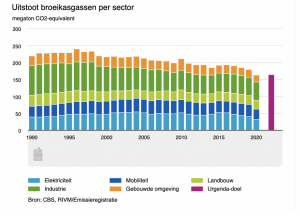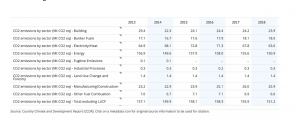125 Final Country Report
albertelli5
Currently, climate change is impacting countries worldwide and use of social media is increasing alongside that. This report will explore the effectiveness of social media for Dutch citizens as they try to get the Dutch government’s attention regarding climate change. Within the past couple of years, the Netherlands has taken action to reduce emissions through laws. However, the effectiveness of certain laws is questionable. Dutch citizens are utilizing social media for various reasons, including raising awareness, sharing information, and gathering support in opposition of the Dutch government’s actions surrounding climate change.
The government in the Netherlands is described as a constitutional monarchy. Therefore, the head of state is either the King or Queen who enforces the Constitution. Their power is quite limited, in fact, the ministers are mostly responsible for the government’s actions. The discussions around climate change and the environment began in the Netherlands in 2011 as they had a local climate agenda. The Climate Plan, which was adopted in 2019 requires countries in the EU are requites to submit data to the European Commission. Later, the Urgenda Case which was brought to the Dutch government was monumental in regard to climate change policies. In regard to free speech in the country, it is encouraged, however it wasn’t until 2019 when the government abolished the persecution of someone who speaks in opposition of the King/Queen and their family.
The Dutch Urgenda Foundation aims for a speedy transition towards a sustainable society, with a focus on the transition towards renewable energy. The Urgenda Case against the Dutch government resulted in the Netherlands being first country in the world in which citizens established that the government has a legal duty to prevent dangerous climate change. This case was not solidified until December 20, 2019, when the Dutch supreme court upheld previous decisions in the Urgenda Climate Case. This climate case is instrumental in the Netherlands effort to combat climate change, however, there seems to be little communication with citizens and the government has no course of action if these goals are not met. The Urgenda case states that “Greenhouse gas emissions in the Netherlands must be reduced by 25% (compared to 1990 levels) by the end of 2020. This was ruled by the The Hague District Court in 2015 in the case of the Urgenda Foundation against the Dutch State. The Court of Appeal in The Hague and the Supreme Court confirmed the court order respectively in 2018 and 2019. The Supreme Court ruled that the Court of Appeal was allowed and could decide that the Dutch State is obliged to achieve the 25% reduction by the end of 2020, on account of the risk of climate change that could also have a serious impact on the rights to life and well-being of residents of the Netherlands. The government will continue to make every effort to achieve this goal.”( Ministerie van Economische Zaken, Landbouw en Innovatie,2020.) It also states that “Each country is responsible for its own share of GHG emissions. Hence, it cannot escape responsibility by arguing that, compared to the rest of the world, its own emissions are relatively limited in scope and that a reduction would have very little impact on a global scale”( Ministerie van Economische Zaken, Landbouw en Innovatie, 2020).
This graph identifies the Urgenda aim for CO2 in the air from the Urgenda Case.
Image 1.0.

Citizens of the Netherlands are pushing for the government to make these changes. For instance, “Fifty-three percent of Dutch people are positive about energy transition. Over half of the population believe it is positive or very positive that the government wants to make the Netherlands free of natural gas by switching to sustainable energy sources” ( Ministerie van Economische Zaken, Landbouw en Innovatie, 2020). Additionally, the people of the Netherlands are urging for the Dutch government to be more transparent in regard to climate actions in their country. An article from The Guardian, a global news organization shares how climate activists in the Netherlands are demanding transparency from their government regarding funds and connections to Shell corporation. This article discussed pleas for climate action, more specifically Extinction Rebellion Netherland’s mission to accomplish this. This article does so by explaining the specific non-violent movements the Extinction Rebellion has led and quotes from certain spokespeople. photographic evidence of certain protests surrounding this topic as well as demands from the Dutch Ministry of Economic and Climate Affairs. This group utilized social media heavily in order to share the information of this protest and get support. In this case, social media was successful in the sense that they were able to gather tons of people for this protest and were able to post about it heavily. Additionally, the article included links to news reports regarding the Extinction Rebellion’s efforts. This proves that the citizens are holding their government accountable for their actions and demanding for them to display all information to the people of the Netherlands through the use of social media.
There seems to be no punishment or further action in place if these countries, especially the Netherlands does not meet these climate goals. It is now 2022, and although there is some improvement, as show in image 1.0, they did not meet climate goals. “The Netherlands will likely miss climate targets set for 2030 unless more is done to curb greenhouse gas emissions quickly, the Dutch government’s climate policy adviser (PBL) said on Thursday. Emissions of carbon dioxide (CO2) in the euro zone’s fifth-largest economy will be 38% to 48% lower than in 1990 by 2030, the PBL said, based on current policies and measures announced for the years to come” (Person, and Bart H. Meijer, 2021). Therefore, the whole Urgenda Case proves to not be so impactful if the countries do not face punishments or follow some course of action to meet these goals. The Netherlands did however make progress in reducing CO2 emissions as shown in image 2.0 below. However, this is not enough to meet the Urgenda goals. This is where the use of social media comes in, as an attempt to hold the government accountable for not reaching these goals and demanding change, but is it effective enough?
Currently, there are 11.77 million social media users in the Netherlands. This accounts for approximately 88% of their population. Experts also say this number will increase from 11.77 million to 12.5 million by 2025. Social media usage is spread over a wide demographic of users, ranging from young adults to elderly. Daily internet use in the Netherlands is 82%, however a study conducted there is a 0.066% correlation between time spent on the internet and perceived efficacy of information ( Tuitjer, Dirksmeier, 2021) This proves people may not be swayed by what they see on social media, but it does not take away from the audience reached.
Image 2.0

Overall, it is evident that social media is effective in some regards to combatting climate change and reaching the Dutch government, but it is not enough to reach the results needed for real change. Netherlands have taken steps to combat climate change, but further action must be taken to meet goals, and citizens must think further about the use of social media as their most impactful tool. As citizens push the government to become transparent with a growing percentage of people positive about this energy transition, the Netherlands must be held accountable for missing goals and provide a course of action that will allow them to meet these goals and the use of social media will not be sufficient on its own. Perhaps Dutch citizens will have to be creative in ways to reach their goals and keep the government on a sustainable path.
References
“Climate Case Explained.” Urgenda, 22 Dec. 2019, https://www.urgenda.nl/en/themas/climate-case/climate-case-explained/.
“Country Climate and Development Report (CCDR).” DataBank, https://databank.worldbank.org/source/country-climte-and-development-report-(ccdr).
“Dutch Climate Activists Block Climate Ministry Entrance to Demand Release of ‘Shell Papers.’” Global Voices, 22 Jan. 2021, https://globalvoices.org/2021/01/22/dutch-climate-activists-block-climate-ministry-entrance-to-demand-release-of-shell-papers/.
Home – Data Commons, https://datacommons.org/.
Leonie Tuitjer, Peter Dirksmeier, Social media and perceived climate change efficacy: A European comparison, Digital Geography and Society, Volume 2, 2021, 100018,
Ministerie van Economische Zaken, Landbouw en Innovatie. “Climate Policy.” Climate Change | Government.nl, Ministerie Van Algemene Zaken, 31 Jan. 2020, https://www.government.nl/topics/climate-change/climate-policy.
Person, and Bart H. Meijer. “Netherlands Set to Miss 2030 Climate Goals without Further Action.” Reuters, Thomson Reuters, 28 Oct. 2021, https://www.reuters.com/business/cop/netherlands-set-miss-2030-climate-goals-without-further-action-2021-10-28/.
Spier, J. ‘The “Strongest” Climate Ruling Yet’: The Dutch Supreme Court’s UrgendaJudgment. Neth Int Law Rev 67, 319–391 (2020). https://doi.org/10.1007/s40802-020-00172-5
“The Netherlands Reaches Climate Target, but Luck Played a Major Role.” DutchNews.nl, 9 Feb. 2022, https://www.dutchnews.nl/news/2022/02/the-netherlands-reaches-climate-target-but-luck-played-a-major-role/.
References
“Climate Case Explained.” Urgenda, 22 Dec. 2019, https://www.urgenda.nl/en/themas/climate-case/climate-case-explained/.
“Country Climate and Development Report (CCDR).” DataBank, https://databank.worldbank.org/source/country-climte-and-development-report-(ccdr).
“Dutch Climate Activists Block Climate Ministry Entrance to Demand Release of ‘Shell Papers.’” Global Voices, 22 Jan. 2021, https://globalvoices.org/2021/01/22/dutch-climate-activists-block-climate-ministry-entrance-to-demand-release-of-shell-papers/.
Home – Data Commons, https://datacommons.org/.
Ministerie van Economische Zaken, Landbouw en Innovatie. “Climate Policy.” Climate Change | Government.nl, Ministerie Van Algemene Zaken, 31 Jan. 2020, https://www.government.nl/topics/climate-change/climate-policy.
Person, and Bart H. Meijer. “Netherlands Set to Miss 2030 Climate Goals without Further Action.” Reuters, Thomson Reuters, 28 Oct. 2021, https://www.reuters.com/business/cop/netherlands-set-miss-2030-climate-goals-without-further-action-2021-10-28/.
Spier, J. ‘The “Strongest” Climate Ruling Yet’: The Dutch Supreme Court’s UrgendaJudgment. Neth Int Law Rev 67, 319–391 (2020). https://doi.org/10.1007/s40802-020-00172-5
“The Netherlands Reaches Climate Target, but Luck Played a Major Role.” DutchNews.nl, 9 Feb. 2022, https://www.dutchnews.nl/news/2022/02/the-netherlands-reaches-climate-target-but-luck-played-a-major-role/.